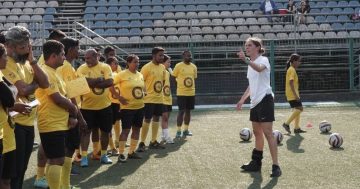
Screenshot of the confrontation between the under-23 men’s teams at Deakin Stadium last Saturday (23 July). Photo: Supplied.
A brawl at Deakin Stadium over the weekend that resulted in the cancellation of a football game in the 80th minute has highlighted the dangers to referees overseeing community sport and the challenge of attracting match officials, especially in the ACT.
One referee told Region the on-field incident involved up to 10 players from the under-23s men’s teams and was an example of the stressful conditions officials were placed under.
“The referee went, you know what, no one’s safe out here, and that’s enough,” the referee said. “That tells you there are issues with the culture and what’s going on.
“It was a very nasty incident, and I am hoping the player that was involved is okay. Then obviously, there’s the impact on the referee.
“No referee wants to deal with violence. You don’t go out there on a weekend and want to have to break up a brawl and see someone get sucker punched.”
In a written statement, Capital Football said it was aware of an incident during the under-23 match between Canberra Croatia and West Canberra Wanderers on Saturday, 23 July.
“Capital Football does not condone violence in any way,” the statement said.
“Initial suspensions will be imposed based on the match officials’ reports and consideration will be given to further charges after a detailed investigation.”
It’s the latest incident marring a difficult season for Capital Football that has already seen two matches postponed in the past fortnight because of a shortage of referees.
The referee crisis was flagged almost 12 months ago when referees claimed a culture of abuse was driving people away.
However, in a written directive, they have been told not to talk to the media about the issues.
“If you speak to any referees at the moment, none of us will speak publicly,” one said.
“There’s some stuff going on and it’s just not appropriate for any of us to speak on the record with our names.”
Capital Football CEO Chris Gardiner said an NPL women’s game between Canberra United Academy and Tuggeranong United, and a CPL men’s game between Tuggeranong United and Canberra White Eagles had to be postponed because of a lack of appropriately qualified match officials, but he said a number of factors were at play.
“Capital Football is aware that we are facing very significant challenges for refereeing and referee coverage in Canberra, whilst the challenge facing referee retention and recruitment is multifaceted,” Mr Gardiner said.
“The key issues in terms of recruitment and retention include what referees continue to experience at matches in terms of player, team official and spectator conduct, low referee fees (by comparison with other Member Federations and in terms of hourly rates for weekend work in other sectors), significant loss of junior referees not progressing into senior ranks, the decision of many older referees not to continue and the need to invest in support and training for club CVOs [club vested officials] and referee coordinators.
“Availability of officials has also, of course, been impacted by the COVID pandemic and continues to be so.”
Capital Football said it was taking the issues very seriously.
“Whilst it does not help address immediate club frustrations with game coverage, in response to these issues, the CEO is developing actions to be announced in the next several days and a plan for 2023 to address the multiple factors impacting refereeing numbers, qualifications and availability.”
One long-time Capital Football referee said there simply weren’t enough referees to cover competitions.
“Matters such as COVID, numerous abuse incidents that have not been dealt with anywhere near appropriately and a lack of respect coming from some of the participants in football, has led to a very poor matchday experience for a lot of referees,” the referee said.
“Referees are not comfortable in being in the environment and to go out and stand on a field for 90 minutes only to get yelled at or go home and read horrible things about themselves on social media.
“That’s the environment we’re currently in and, as a refereeing body, we are desperately trying to change the culture around what’s taking place and we are very open to having conversations with people to help them understand.”
The referee said although Capital Football had launched a RESPECT campaign and proposed rules to endorse change, people who weren’t referees did not appreciate or understand the pressures associated with the job.
Most referees officiate between two and four games every weekend.
“Although we get paid to do it, a lot of us also become referees because we love the challenge and the skills we build,” one said.
However, the abuse was a deal-breaker.
“If you can sit there and criticise and abuse referees, pick up a flag and do it yourself,” the referee said.




















